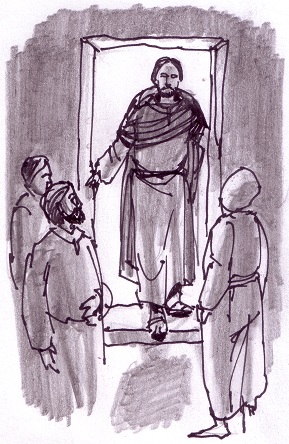

“It is the decision of the Holy Spirit and of us not to place on you any burden beyond the necessary” (Acts 15:28).
Acts 15:22-31; John 15:12-17
To stand at the headwaters of a great river that begins as a small stream is to imagine the chance to divert that river at its source and determine a different course and destination.
Church history provides a similar imaginary moment with the first Council of Jerusalem. Had Paul and Barnabas not convinced the leaders of the mother church that it was the will of the Holy Spirit that Gentile converts need not become Jews in order to be Christians, the church today might be a sect of Judaism instead of the Catholic church as we know it.
Because the first disciples were all Jews, it is not hard to understand why they wanted to preserve continuity between their newfound faith and their observance of the Mosaic Law and the practice of circumcision and dietary rules as part of their identity. If others wanted to join them, they, too, should embrace these covenantal identifiers.
Yet, Paul witnessed that Gentile converts were filled with the same Holy Spirit as they came to faith in Jesus, and that if additional conditions were placed on them it would annul the power of Jesus’ sacrifice on the cross as sufficient to save them. His grace was given unconditionally and universally.
This freedom from the Law is essential to the Gospel. We are saved by God’s mercy, not by obedience or ritual practice. God’s love is for sinners as well as the righteous. We cannot earn it or merit it by our own efforts; it is pure gift. This is the meaning of Jesus’ final revelation to his disciples on the eve of his death, that though they would all fail him, his love had already claimed them and made them the friends he was about to lay down his life for.
Legalism has its appeal. It offers a standard we imagine will satisfy God if we keep all the rules. It offers the illusion of perfection. But it also risks a lifetime of scrupulosity, score keeping and judgementalism. It is a morality and a spirituality based on fear. Even small failures cast us down and rob us of the human experience of learning from our mistakes, of being compassionate with others who fail. What joy is there in being right if it makes us righteous, perfect if it isolates us in pride and self-sufficiency?
Perfect love drives out fear. God’s love frees us to explore life’s ambiguities, the risks of being hurt in love, wrong in pursuing the truth, the fun of finding companions among our weak and sinful fellow human beings as we journey together to the God who welcomes home the prodigal son.
Advertisement




